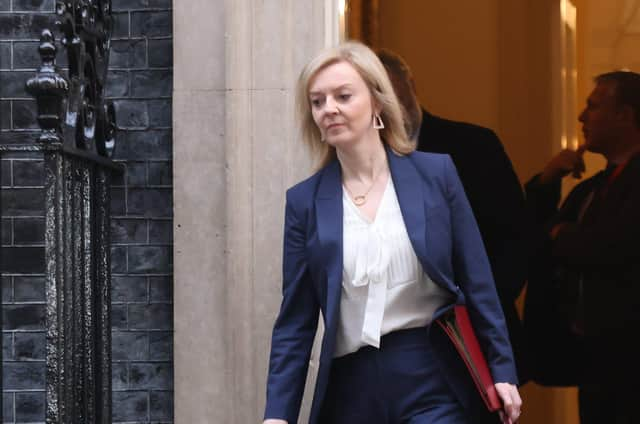Owen Polley: The government’s ‘tough’ new stance on the Northern Ireland Protocol may not amount to much


The Times said the foreign secretary had ‘lost faith’ in negotiations with the EU and wanted Boris Johnson to use the ‘emergency brake’ clause to suspend controversial aspects of the Irish Sea border.
That sounds, on the face of it, like good news for unionists. But you would be forgiven for being sceptical about this apparent change in mood.
Advertisement
Hide AdAdvertisement
Hide AdWe’ve heard this kind of rhetoric from ministers before. It would be great to think that the government had finally found its backbone, but there are many reasons to remain doubtful.
When you read reports like this, that do not include quotes from the politicians involved directly or draw on their press statements, they’ve generally come about in one of three ways.
Sometimes, the minister herself may have briefed a journalist off the record. More frequently, she will have asked an unnamed ‘source’ to issue the briefing, because she wanted the story to become public. Occasionally, the briefing may even be inaccurate, coming from an official in the department who has their own agenda.
This particular report followed some controversy for the government about the protocol.
Advertisement
Hide AdAdvertisement
Hide AdLast week, it was forced to withdraw an amendment to old customs legislation that replaced the words ‘United Kingdom’ with ‘Great Britain’. That measure created anger among Northern Irish unionists and Conservative backbenchers, who said that it showed ministers were giving up on renegotiating the Irish Sea border or triggering article 16.
Officials from the Treasury denied this interpretation, claiming that the change was a formality, designed to make trade between Northern Ireland and Great Britain easier.
Liz Truss, though, took the credit for forcing a u-turn, supposedly pressuring her colleagues into backing down because the statutory instrument undermined her negotiations with the EU. The foreign secretary, of course, is thought to have ambitions of becoming the next leader of the Conservative party. She cultivates an uncompromising image among Tory activists, drawing on comparisons with her heroine, Margaret Thatcher.
After a difficult week, rather than indicating a new policy, some hardline briefing could have been intended to maintain this reputation. After all, the previous weekend we read that Ms Truss favoured implementing a ‘green lane’ at Ulster ports and introducing tax incentives for GB - NI goods, in order to avoid triggering Article 16.
Advertisement
Hide AdAdvertisement
Hide AdIt may not be a coincidence that on Friday and Saturday the Conservative Party held its ‘Spring Conference’ in Blackpool. While the main party event in the Autumn is a glitzy affair that includes thousands of lobbyists and journalists, the spring conference is attended overwhelmingly by grassroots activists. It’s exactly the kind of environment where ministers might get a hard time, if they are perceived as soft on the EU or cavalier about the future of the Union.
At the same time, Boris Johnson is scheduled to speak to the head of the European Commission, Ursula von der Leyen, today. The government has talked tough on many occasions ahead of key conversations with the EU. To date, though, it has failed to follow through on its threats.
The customs amendment fiasco, coupled with the Appeal Court’s ruling that the Irish Sea border did not breach the ‘principle of consent’, may have applied a certain amount of pressure on the prime minister to prove that he is really committed to changing the protocol. Some high-profile Tories, like the former Brexit minister, Steve Baker, have expressed anger at the government’s handling of negotiations so far. He recently demanded that Johnson trigger article 16 immediately, during a speech to Belfast activists.
While Tory politicians are involved in these manoeuvres, in Northern Ireland there is still a group of people completely determined to play down unionist anger about the protocol.
Advertisement
Hide AdAdvertisement
Hide AdThey constantly repeat the absurdity that all the problems associated with the Irish Sea border are caused by Brexit. It’s as if, when Britain voted to leave the EU, history stopped and remainers escaped responsibility for any subsequent decisions.
The truth is that, after the poll, NI’s links to Great Britain and its place in the UK internal market should have been everyone’s priority, due to their overwhelming political and economic importance. Instead, thanks to the lies of Irish nationalists and EU toadies, distortion of the Belfast Agreement and (let’s be honest) an implied threat of republican terrorism, our place in the EU single market and nationalism’s need to pretend that the land border did not exist were prioritised.
There is an ongoing debate in the Conservative Party about its part in this capitulation.
The government is aware that, in league with the EU, it imposed an unjust, self-destructive arrangement on Northern Ireland. Ideally, at least, it would like to dismantle the worst aspects of the protocol. But it’s still not at all clear that it’s prepared to face down Brussels in order to repair the UK.